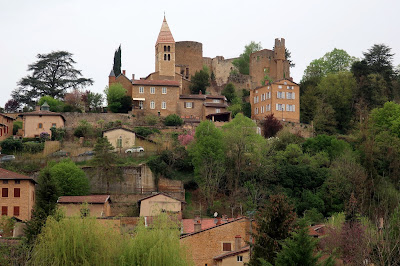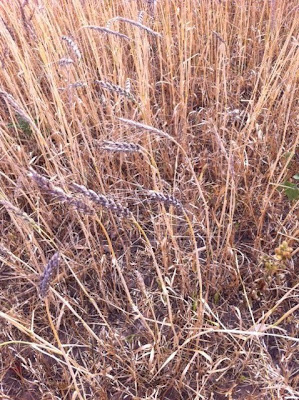R & R in Lincolnshire
It is hard to believe that Lincolnshire is even flatter than the Canadian prairies, and yet it isn't surprising. Over the years, more and more land has been reclaimed from the sea so it is flat and fertile with ditches rather than hedges separating the fields. I am staying in a very small village called Fosdyke which literally means 'ditch-ditch'. Many of the villages were initially founded on islands in the middle of the rivers. Just beyond the almshouses you can see two sea walls. The closest one is the medieval sea wall that was built centuries ago to hold back the tides and floods. Beside the River Welland is the more recently-constructed sea wall. The sea has been pushed back year after year to reclaim more land.
The house is one of a series of almshouses that were originally built in 1615 with a generous bequest from a local when he died. There is a jewel of a garden surrounding the house that is so very British. Lavender bushes border the path, and roses and clematis frame the windows. Beyond the garden there are fields of wheat and large expanses of sky. The rooms have low, beamed ceilings, and even I have to duck as I enter the dining room. Large chimney places occupy a central spot in the two front rooms. The houses were enlarged and doubled in size in the 1980s but maintain the heritage appearance with beams from France. Janet and Richard have decorated it beautifully and yet comfortably. I sink into comfortable chairs while admiring the original art on the walls. It is a very restful, pleasant place to spend part of my holidays.
August has been very wet, and the farmers are struggling to harvest the wheat, potatoes, cabbages, and cauliflowers when they can. Traffic is slowed down by lumbering tractors, and there are crews of migrant workers, many of them from Poland, in the fields throwing cauliflower into large canvas-sided trailers. Richard says that it's a hard life for the migrant workers who make very little money while the farmers and crew bosses make good money and buy fancy cars. It's fertile land because of its origins so Lincolnshire is an important farm production area.
Although the fields are large and flat, the countryside in no way resembles Saskatchewan. We are only 15 minutes from Spalding, a major town, and there are small villages scattered across the last landscape, only one or two miles apart. Church towers and steeples dot the sky. We drive to Holbeach to pick up some groceries at Tesco and stop on our way back to visit a beautiful Norman church in Whaplode. Their is a very moving 17th century memorial to some local nobles. The couple are stretched out in all their finery as if on a bed surrounded by 10 columns. Kneeling along the sides of the bed are their five children. The figures are sculpted lovingly and in great detail - I long for more information for they look like a very happy family.
The countryside is crisscrossed by a complex network of footpaths, bridle paths and cycle paths. My first walk was along the modern sea wall beside the river. To find the start of the footpath, I turn right at the coastguard cottages (there is a small marina beside the bridge, both leisure and industrial boats) then proceed on through a gate marked Private Property and continue up the driveway until I reach the top of the bank. The land is very featureless with little on the horizon except a boat dredging the river channel. The path does a zigzag, and I cautiously descend a steep bank and stumble through the ditch and up the other side, trying, unsuccessfully, to avoid the patches of stinging nettles. I then follow a track between two fields of potatoes and wheat until I reach the road.
I am staying with cousins whom I have visited frequently over the years, and I settle easily into a comfortable routine. I am quickly absorbed into their large family with 4 children and 9 grandchildren ranging in age from 5 months to 18 years. The baby is a delight. He has a big grin and loves to be held and to bounce in your arms. It is lovely to temporarily become a part of this extended family. I also feel younger in England as I came here so often in my teenage years.
The weather is very variable with rain and cloud only infrequently interspersed with warm, sunny spells. I take advantage of the sunshine to walk or sit on a garden bench and feel the sun on my face. I am thoroughly enjoying the isolation and quiet to read voraciously. Janet had amassed a stack of books for me to read, and I am doing my best to devour them all before I leave. I highly recommend The Uncommon Reader by Alan Bennett about the Queen of England starting to read and the impact it has on her life. It's a charming book portraying the power and importance of the written word. Hunting and Gathering by Anna Gavalda brings tears to my eyes and helps me to believe in the inherent, although often buried, kindness of human beings. Four very fragile, broken human beings come together and form a community. It's a heartwarming story, and the character development is absolutely sensational.
Take out curry is on the menu for supper this evening - such a ubiquitous part of British life. And it will be accompanied by cider and baklava that we purchased at the continental market in Spalding this morning.
The house is one of a series of almshouses that were originally built in 1615 with a generous bequest from a local when he died. There is a jewel of a garden surrounding the house that is so very British. Lavender bushes border the path, and roses and clematis frame the windows. Beyond the garden there are fields of wheat and large expanses of sky. The rooms have low, beamed ceilings, and even I have to duck as I enter the dining room. Large chimney places occupy a central spot in the two front rooms. The houses were enlarged and doubled in size in the 1980s but maintain the heritage appearance with beams from France. Janet and Richard have decorated it beautifully and yet comfortably. I sink into comfortable chairs while admiring the original art on the walls. It is a very restful, pleasant place to spend part of my holidays.
August has been very wet, and the farmers are struggling to harvest the wheat, potatoes, cabbages, and cauliflowers when they can. Traffic is slowed down by lumbering tractors, and there are crews of migrant workers, many of them from Poland, in the fields throwing cauliflower into large canvas-sided trailers. Richard says that it's a hard life for the migrant workers who make very little money while the farmers and crew bosses make good money and buy fancy cars. It's fertile land because of its origins so Lincolnshire is an important farm production area.
Although the fields are large and flat, the countryside in no way resembles Saskatchewan. We are only 15 minutes from Spalding, a major town, and there are small villages scattered across the last landscape, only one or two miles apart. Church towers and steeples dot the sky. We drive to Holbeach to pick up some groceries at Tesco and stop on our way back to visit a beautiful Norman church in Whaplode. Their is a very moving 17th century memorial to some local nobles. The couple are stretched out in all their finery as if on a bed surrounded by 10 columns. Kneeling along the sides of the bed are their five children. The figures are sculpted lovingly and in great detail - I long for more information for they look like a very happy family.
The countryside is crisscrossed by a complex network of footpaths, bridle paths and cycle paths. My first walk was along the modern sea wall beside the river. To find the start of the footpath, I turn right at the coastguard cottages (there is a small marina beside the bridge, both leisure and industrial boats) then proceed on through a gate marked Private Property and continue up the driveway until I reach the top of the bank. The land is very featureless with little on the horizon except a boat dredging the river channel. The path does a zigzag, and I cautiously descend a steep bank and stumble through the ditch and up the other side, trying, unsuccessfully, to avoid the patches of stinging nettles. I then follow a track between two fields of potatoes and wheat until I reach the road.
I am staying with cousins whom I have visited frequently over the years, and I settle easily into a comfortable routine. I am quickly absorbed into their large family with 4 children and 9 grandchildren ranging in age from 5 months to 18 years. The baby is a delight. He has a big grin and loves to be held and to bounce in your arms. It is lovely to temporarily become a part of this extended family. I also feel younger in England as I came here so often in my teenage years.
The weather is very variable with rain and cloud only infrequently interspersed with warm, sunny spells. I take advantage of the sunshine to walk or sit on a garden bench and feel the sun on my face. I am thoroughly enjoying the isolation and quiet to read voraciously. Janet had amassed a stack of books for me to read, and I am doing my best to devour them all before I leave. I highly recommend The Uncommon Reader by Alan Bennett about the Queen of England starting to read and the impact it has on her life. It's a charming book portraying the power and importance of the written word. Hunting and Gathering by Anna Gavalda brings tears to my eyes and helps me to believe in the inherent, although often buried, kindness of human beings. Four very fragile, broken human beings come together and form a community. It's a heartwarming story, and the character development is absolutely sensational.
Take out curry is on the menu for supper this evening - such a ubiquitous part of British life. And it will be accompanied by cider and baklava that we purchased at the continental market in Spalding this morning.





Comments